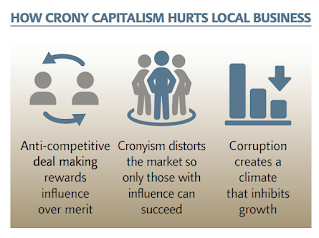In a true free market, competition thrives on the principles of merit and fairness, allowing the best products and services to rise to the top. However, when crony capitalism takes root, these principles are undermined, leading to a distortion of market dynamics and a significant erosion of economic efficiency and equity.
Defining Crony Capitalism
Crony capitalism refers to an economic system in which business success is heavily influenced by close relationships between business leaders and government officials. Rather than competing on the basis of quality, innovation, and efficiency, businesses gain advantages through preferential treatment, subsidies, regulatory favors, and other forms of government intervention that disadvantage their competitors. This practice undermines the foundation of a free market, where success is determined by market forces and consumer choice.
The Erosion of Fair Competition
One of the most profound impacts of crony capitalism is the erosion of fair competition. In a free market, companies must innovate and improve their offerings to attract customers and sustain growth. However, crony capitalism allows certain businesses to bypass this crucial aspect of market dynamics. By securing favorable regulations, tax breaks, and government contracts, crony firms can undercut their competitors or maintain market dominance without having to compete on equal footing.
This distortion not only stifles innovation but also discourages new entrants from entering the market. New businesses, lacking the same connections and influence, find it challenging to compete with established firms that enjoy government favoritism. As a result, the market becomes less dynamic and less responsive to consumer needs, ultimately leading to stagnation and reduced economic growth.
Resource Misallocation
Crony capitalism often leads to inefficient allocation of resources. When businesses receive government support or protection, they may invest in projects or products that are not necessarily aligned with consumer demand or societal needs. This misallocation can lead to overproduction in certain sectors while others suffer from a lack of investment and development. For example, subsidies for fossil fuel industries can crowd out investment in renewable energy technologies, even as the demand for sustainable solutions grows.
The impact of crony capitalism is not limited to economic inefficiency; it also exacerbates income inequality and social unrest. When a small group of businesses and their allies control significant economic resources through their political connections, the wealth gap widens. The general public, who are often excluded from these networks, may see little benefit from economic growth and may even experience a decline in their standard of living.
This growing disparity can lead to disillusionment and dissatisfaction with the economic system, fueling social and political instability. The perception that the game is rigged against ordinary people can erode trust in institutions and democratic processes, further destabilizing the economy and society.
Addressing the Challenge
Addressing the challenges posed by crony capitalism requires a multifaceted approach. Strengthening regulations to prevent conflicts of interest, promoting transparency in government contracts, and ensuring that competition laws are robust and effectively enforced are crucial steps. Additionally, fostering an inclusive economic environment that supports entrepreneurship and innovation can help counterbalance the advantages enjoyed by crony firms.
Ultimately, restoring the integrity of free markets in the face of crony capitalism is essential for promoting sustainable economic growth, enhancing social equity, and ensuring that the benefits of prosperity are widely shared. By reasserting the principles of fairness and competition, societies can build markets that truly serve the interests of all, not just the privileged few.



